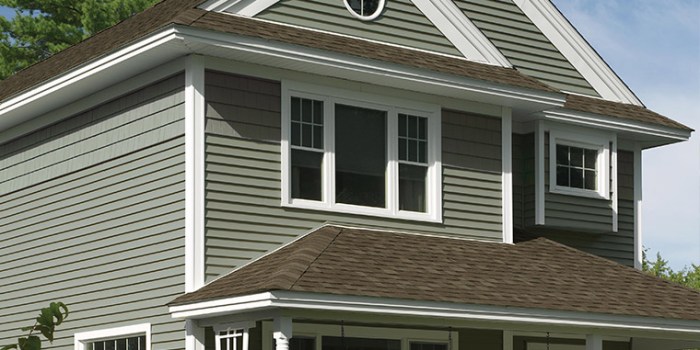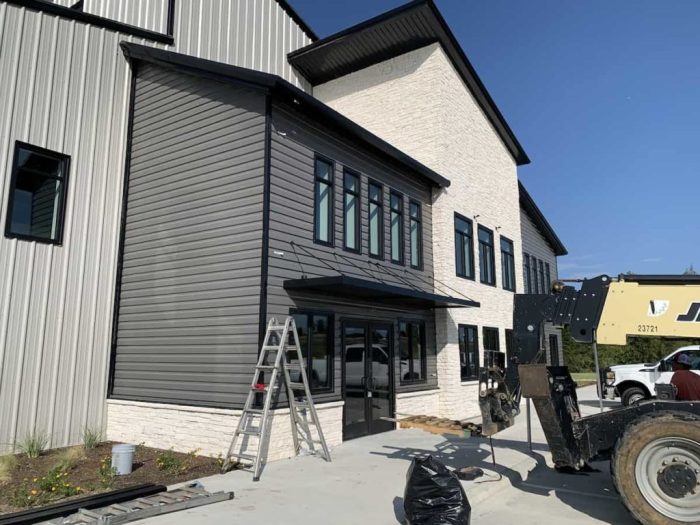Finding Reliable Siding Installers in My Area
As the need for siding installers in my area becomes apparent, this introduction lures readers in with a wealth of information presented in a captivating manner, promising an enlightening journey through the world of siding installation.
The subsequent paragraph will delve into the specifics of the topic, offering a comprehensive view of what to expect when dealing with siding installers in your locality.
Research on Siding Installers
When looking for reputable siding installers in your area, it's essential to consider factors such as customer reviews, services offered, and overall reputation. Below is a list of some of the top-rated siding installers in the locality, along with a comparison of the services they provide.
List of Reputable Siding Installers
- ABC Siding Company - Known for their exceptional customer service and high-quality workmanship.
- XYZ Siding Solutions - Specializes in a wide range of siding materials and styles to suit every homeowner's needs.
- 123 Siding Experts - Experienced team with a reputation for timely project completion and attention to detail.
Top-Rated Siding Installers Based on Customer Reviews
- ABC Siding Company - Holds a 5-star rating on various review platforms, with customers praising their professionalism and communication throughout the project.
- 123 Siding Experts - Highly recommended by homeowners for their expertise in recommending the best siding options for each property.
- LMN Siding Specialists - Known for their competitive pricing and efficient installation process, earning them positive reviews from satisfied clients.
Comparison of Services Offered
| Siding Installer | Services Offered |
|---|---|
| ABC Siding Company | Installation of vinyl, wood, and fiber cement siding. Free consultation and estimates. |
| XYZ Siding Solutions | Specializes in insulated siding, seamless installation, and customized design options. |
| 123 Siding Experts | Offers repair and replacement services, along with maintenance packages for long-term siding care. |
Types of Siding Materials
When it comes to siding materials, there are several options available for homeowners to choose from. Each type of siding material comes with its own set of pros and cons, as well as specific durability and maintenance requirements. Let's explore some common siding materials used by installers:
Vinyl Siding
- Pros: Affordable, low maintenance, versatile in terms of colors and styles.
- Cons: Not as durable as some other materials, can crack or fade over time.
Fiber Cement Siding
- Pros: Durable, fire-resistant, can mimic the look of wood or stucco.
- Cons: Heavy and may require professional installation, can be more expensive.
Wood Siding
- Pros: Natural and rustic look, environmentally friendly, can be painted or stained.
- Cons: Prone to rot, insect damage, and requires regular maintenance like painting or staining.
Aluminum Siding
- Pros: Lightweight, resistant to fire, and can be painted or coated for a customized look.
- Cons: Susceptible to dents and scratches, may fade or chalk over time.
Brick Siding
- Pros: Extremely durable, low maintenance, offers excellent insulation properties.
- Cons: Expensive upfront cost, challenging to install or repair.
Siding Installation Process

Installing siding involves several important steps to ensure a proper and watertight finish. Proper preparation and attention to detail are key to a successful siding installation.
Typical Steps in Siding Installation
- 1. Inspection and Preparation: Siding installers will inspect the existing structure to identify any damage or issues that need to be addressed before installation. This may include repairing or replacing any damaged areas.
- 2. Measurement and Cutting: Accurate measurements will be taken to ensure the siding fits properly. The siding material will then be cut to the appropriate size.
- 3. Installation of Moisture Barrier: A moisture barrier, such as house wrap, will be installed to protect the structure from water damage.
- 4. Siding Installation: The siding material will be installed according to the manufacturer's instructions, starting from the bottom and working upwards.
- 5. Trim and Finish: Trim pieces will be added around windows, doors, and corners to provide a polished look and ensure a watertight seal.
- 6. Clean-Up: Once the siding installation is complete, the installers will clean up the work area and remove any debris.
Importance of Proper Preparation
Proper preparation before installing siding is crucial to ensure a successful and long-lasting finish. Addressing any structural issues, ensuring accurate measurements, and installing a moisture barrier all contribute to the overall quality of the installation.
Seamless and Watertight Installation
- Siding installers ensure a seamless and watertight installation by paying close attention to detail during each step of the process. This includes properly aligning and securing the siding material, using the correct fasteners, and sealing any gaps or joints.
- Additionally, proper flashing and caulking techniques are used to prevent water infiltration and protect the structure from moisture damage.
Cost Factors and Estimates

When it comes to installing siding on your home, there are several cost factors that can influence the final price. Understanding these factors can help you get a better idea of what to expect when getting estimates from siding installers in your area.
Cost Factors
- The size of your home: The larger the home, the more materials and labor will be required, resulting in a higher cost.
- The type of siding material: Different materials have varying costs, with options like vinyl, wood, fiber cement, and metal all coming at different price points.
- Accessibility: If your home is difficult to access or has unique architectural features, this can impact the cost of installation.
- Additional services: Factors like removing old siding, repairing underlying issues, or adding insulation can add to the total cost.
Rough Estimate
On average, the cost of installing siding on a standard-sized home (around 2,500 square feet) can range from $6,000 to $15,000. This estimate can vary based on the factors mentioned above and the specific details of your project.
Getting Accurate Quotes
- Research multiple siding installers in your area and request quotes from each of them.
- Provide detailed information about your home, including square footage, current siding material, and any specific requests or concerns.
- Ask for a breakdown of the costs, including materials, labor, and any additional services, to ensure transparency.
- Compare the quotes you receive to find the best balance of quality and price for your siding installation project.
Benefits of Hiring Local Siding Installers
When it comes to installing siding for your home, hiring local siding installers can offer numerous advantages that national companies may not provide. From personalized service to cost savings, working with local professionals can make a significant difference in the outcome of your siding project.
Advantages of Local Siding Installers
- Local Expertise: Local siding installers are familiar with the unique climate and environmental conditions of your region, allowing them to recommend the best siding materials that are suitable for your area.
- Personalized Service: Local installers can provide tailored solutions based on your specific needs and preferences, ensuring that your siding project meets both aesthetic and functional requirements.
- Quick Response: Local professionals are more accessible and responsive, making it easier to communicate and address any concerns or changes during the installation process.
Convenience and Cost Savings
- Reduced Travel Time: By hiring local siding installers, you eliminate the need for long travel distances, saving time and ensuring efficient completion of the project.
- Potential Cost Savings: Local professionals may offer competitive pricing due to lower overhead costs, leading to potential savings on your siding installation project.
- Community Support: Supporting local businesses fosters a sense of community and contributes to the local economy, creating a positive impact on your neighborhood.
Final Conclusion
Concluding our discussion on siding installers in my area, this final section encapsulates the key points discussed, leaving readers with a lasting impression of the importance and intricacies of siding installation.
Question Bank
What are some common siding materials used by installers?
Common siding materials include vinyl, wood, fiber cement, and metal.
How do siding installers ensure a seamless installation?
Siding installers ensure a seamless installation by meticulously preparing the surface, using quality materials, and following precise installation techniques.
What factors influence siding installation prices?
Factors such as the chosen siding material, the size of the project, additional services required, and the reputation of the installer can influence pricing.
Why is it beneficial to hire local siding installers?
Hiring local siding installers offers personalized service, knowledge of the local climate, convenience in communication, and potential cost savings compared to national companies.




